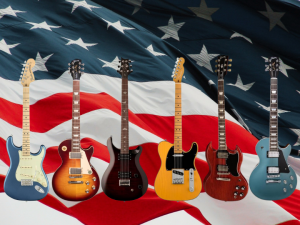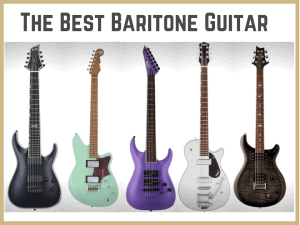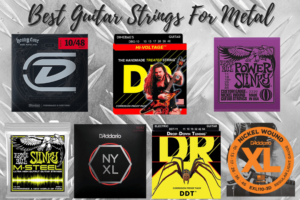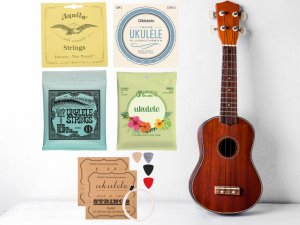This is our review of the very Best Strings For Stratocaster guitars.
My advice right from the word go is to try a few packs and see what suits you and your guitar style best.
Some strings are suited to particular genres of music and certain guitars. In this case, we will look at the 7 best strings I love with my Strat.
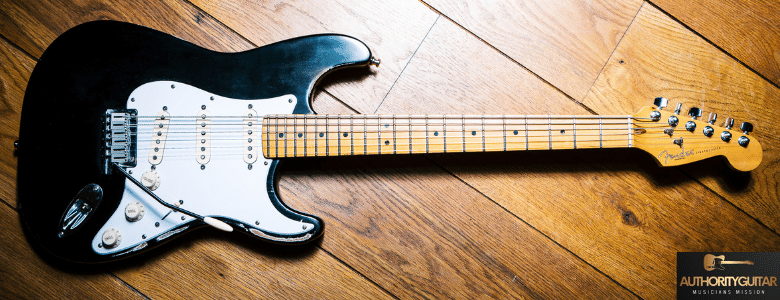
Below you will find some famous guitarists and their string choices and a deeper look into the build and tones you can get from each pack.
Let’s get straight into it.
Best 3 We Love For Your Stratocaster
How To Choose The Best Strings For Stratocaster
Remember, the following strings will be available in all sizes, from light gauge strings for smaller fingers, regular strings, and heavier strings for those who want a more significant tone.
This would be your starting point. Next, decide on what gauge strings your fingers are most comfortable with.
String Gauge Tips
09‘s- (9-42 or 44, 46 reg bottom)
Anything less than a 9 is generally perfect for string gauge for a child or beginner. However, you won’t be getting much in the way of longevity or tone. A 9 gauge string set is very light and easy to press down on without hurting your fingertips. Thinner strings are great for beginners to learn bending notes and glissando without trying too hard.
10’s– (10-46 or 49 Jazz)
10’s are possibly the most popular set for Stratocaster lead guitarists as you’ve got a perfect match of tone and flexibility to tear through your solos without needing too much finger strength. A set of 10’s is also much better for keeping a guitar in tune. Although a little more challenging to play for beginners, I would still consider 10’s as lighter gauge strings.
11’s– (11-49 or 50,52,56 Hvy. Bottom)
11’s are my choice of strings. They’re much more robust and give off a thicker tone in comparison to a set of 10s. One set lasts me a good couple of months before wearing down. As 11’s are a heavier gauge, they’re easier to play alternative tunings, like G or Drop D. I feel much more in control of my lead playing. I would consider 11s to be ‘regular strings.’ You can really get some nice body to your tone at this thickness.
12’s– (12-52 or 54,60 Hvy)
12s are a good starting point for acoustic guitars or electric rhythm playing. If you’re a big fan of open chords, then thicker strings like these are the way to go. The tone is big, bold, and warm. The strings are unlikely to break but are much more difficult to bend or fret chords higher up the neck.
13‘s– (13-56 or 60,62)
Unless you’re Stevie Ray Vaughn, I wouldn’t recommend 13s. Firstly, your guitar will need to be set up differently due to the strings pulling the neck out of place. The nut will also need filing if it hasn’t already. On the flip side, if you’re low tuning down for heavy metal or jazz. Heavy strings definitely bring the best tones. Huge tones that can fill a room. Just don’t be expecting to bend or move these ‘cables’ unless you’re very strong in the finger department.
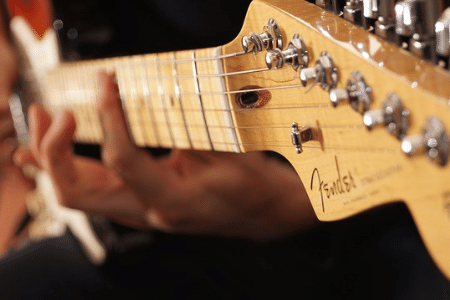
Understanding String Material
Different materials make guitar strings; each material produces a different tone and feel.
When looking for new strings, you might notice that some sets are made with nickel or steel metal, which are common string materials.
Changing strings regularly will help keep your guitar in tune and keep your strings performing at their best.
Traditionally, the type of strings you choose is tied to your preference in sound. Therefore, choose the right strings according to the genre of music.
Nickel Plated Strings Vs. Steel Strings
- Guitarists who favour heavy metal music often use steel strings because they have a very bright tone that cuts through the mix well.
- Steel strings are also easier on beginners’ fingers because they’re heavier and harder to bend.
- Nickel strings have a warmer, mellower tone than blues and country players often favour.
- They’re also more expensive than steel strings.
Brass Vs. Bronze Strings
- Brass strings are made of brass, a metal alloy made of copper and zinc.
- They have a slightly brighter sound than bronze strings.
- Bronze strings are made of bronze, an alloy that is mostly copper with 10% tin and often some other metals.
- They have a warmer tone than brass but are less bright sounding than the steel strings.
Titanium Vs. Regular Strings
- Titanium strings are composed of titanium metal, giving you a brighter tone than regular strings.
- They are also more expensive than steel strings, but they last longer.
- Regular strings are the most common string made with traditional materials like bronze or nickel.
- They have a warmer tone than some guitarists prefer.
Coated Vs. Uncoated Strings
- Coated strings are strings that have a polymer coating on the string’s windings.
- This coating helps keep the strings clean and provides a longer lifespan for the string.
- Non-coated strings don’t have this coating and will corrode and rust over time.
Which Strings Are Right For You?
That’s ultimately up to your personal preference.
Some guitarists like the bright sound of steel strings, while others prefer the warmer tone of nickel strings.
It’s essential to experiment with different strings to find what sounds best to your ears and the genre of music you’re playing.
I’ve primarily been a Strat player for the last ten years. So let’s look at my personal favorites best suited to The Stratocaster guitar or similar.
7 Best Strings For Stratocaster
1- Elixir
Amazing For The Live Guitarist
Elixir are a favorite of mine without doubt. Admittedly, they cost more than the average string, but that’s because they last longer.
Here are 3 types I switch between depending on my guitar mood:
(a)- Nanoweb-Nickel Plated Steel
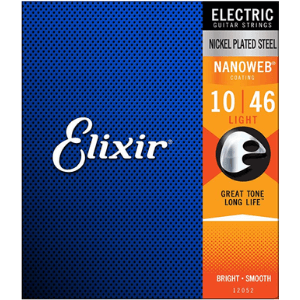
- Key Features: Bright, highly responsive with a metallic twang. Superb soft feel for smoother playing. Stays in tune better than competitors.
- Best For: Perfect for the lead guitarist as the Nanoweb are clear and precise. Sensitive and soft to touch.
- Cons: The Thickness Of Each String Takes Some Getting Used To.
(b)- Polyweb-Nickel Plated Steel
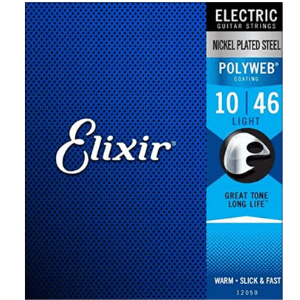
- Key Features: Distinctly warmer in tone. Fingertip Friendly. Great for metal or aggressive players. Slick and String Smooth. Thicker coating gives you that little more to hold on to. Fat tones and punchy low end.
- Best For: Perfect choice for the rock riff meister.
- Cons: Price May Put Players Off
Suppose you are still searching for that brighter sound. Elixir offers a solution.
An Optiweb coating is available. It offers a very thin layer. This provides you a more natural brighter and sharper sound. Perfect for such genres as country or reggae. Any music where the guitar needs to sit at the higher end of the frequency.
(c) Optiweb: Nickel Plated Steel
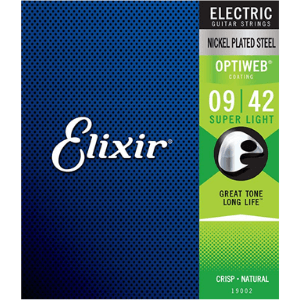
- Key Features: This thinner coating type means you don’t need the initial ‘stretching in’ stage to warm the coating up. Throw the strings on, and you’re ready to play a show. Very similar feel to your ordinary strings.
- Best For: Best choice to start with if you’re trying Elixir for the first time. Familiar feel to your standard string.
- Cons: Not As Thick Tonal Wise Compared To The Other Two
2- D’Addario XT Nickel Plated Steel

Distinctive Sound Unlike Any Other
- Pros: Smooth Strings For The Fingers, Beautifully Balanced sound, Wide Selection Of Choice, Superior Tone
- Cons: Not As Popular In The Guitar World As The Others
I have to mention; the D’Addario XT range is a game-changer for stringed instruments.
Since the release of the new D’Addario XT treatment process, I think the XT will eventually become as popular as the XL collection.
You know how guitarists are with change! We don’t like anything new. Why change if you are already satisfied with a product? Especially our strings!
That being true, it’s worth knowing the impressive manufacturing techniques D’Addario now uses for its XT strings.
The new D’Addario XT treatment process gives the string a durable and thinner coating. It offers the player a feel and sound of an uncoated string but still gives you the significant advantages of a coated string. One major benefit being endurance from any corrosive materials. We all want our strings to last longer
The D’Addario packaging now gives clear options on the front. Like Instrument/gauge/alloy type. When choosing acoustic guitar strings, note there are various alloy types.
Even after all this impressive sales language, it’s all down to you, the player, and what YOU think of the tone qualities.
3- D’Addario Nickel Wound XL

King Of Versatility
- Pros: Super Reliable, Can Play Any Genre, Reliable, Warm and Full Bodied, Can Dial into to that Classic Stratocaster Tone
- Cons: None
Proven All rounders, best electric guitar strings.
D’Addario XL strings are the perfect choice for any musician looking for a guitar string with great tone, longevity, and flexibility.
The nickel-plated wrap wire provides a bright and punchy sound that will stand out in any mix, while the high-quality construction ensures that these strings will last for years to come.
Plus, the extra-light gauge is perfect for players who need a little bit of extra breathing room on their fretboards.
These babies will cover all genres better than the rest of the reviewed strings when it comes to versatility.
D’Addario’s XL Nickel Wound strings are a top seller for a good reason! These strings are made with nickel-plated steel and offer a bright tone and perfect intonation. At the same time, the hexagonally shaped core ensures stellar magnetic output and long life.
Plus, they reduce premature fret wear, so you can concentrate on your music – worry-free.
D’Addario XL Nickel Wound are the player’s choice amongst players of all genres and styles.
With extreme precision, D’Addario can manufacture strings using the most modern technology, resulting in a specifically designed string.
Printed gauges and tensions can be found on the back of each packet, so you always know what you’re getting.
These would absolutely be my go-to choice for the best versatile strings for your Stratocaster.
4- Ernie Ball Super Slinky Nickel Wound

Used by Joe Perry, Eric Clapton, Jeff Beck, John Mayer, Great for Classic Rock
- Pros: Huge Range To Choose From,Very Popular In The Guitar World, Affordable.
- Cons: Not As Long Lasting as Competitors
Are you looking for a guitar string that can give you that signature tone?
Look no further than Ernie Ball Super Slinky Strings for your electric guitar.
Ernie Ball strings are made with the highest quality nickel-wound alloy, so you can rest assured that your sound will be top-notch.
Their signature Slinky gauge provides the perfect balance of easy playability and rich tone. As a result, making them some of the most popular electric guitar strings on the market.
So why not try a set today and see for yourself?
Ernie Ball Super Slinky is the perfect choice for anyone looking for a balanced, well-rounded tone.
The nickel plated steel wrap gives your guitar a bright sound that compliments all playing styles, while the tin plated high carbon steel core provides a warm, mellow tone.
These precision-manufactured strings are made to the highest standards and most exacting specifications to ensure consistency, optimum performance, and long life.
With a vast range of options available, you can find the perfect set of strings to personalize your tone.
Super Slinky Electric Guitar Strings give you that perfect Gibson Les Paul tone!
They’re hugely popular for a reason. Possibly the best choice for guitarists searching for that bright, snappy sound. They’re also calibrated to be just the correct tension, so you can play them all night long without fatigue.
They deliver the perfect balance of clarity and warmth, making them ideal for Blues and Rock guitar styles.
A perfect fit and starter string for all Les Pauls. Every guitarist should try a pack of Ernie Ball Super Slinky at least once.
5- Fender 150R Pure Nickel Electric Guitar Strings

Great Choice For Beginners
- Pros: For Jazz, Blues & Country, Very Affordable, Great Range of Textures, Softer Strings
- Cons: Not longer lasting
The Fender 150R Pure Nickel Electric Guitar Strings are the perfect choice for classic, round, full tones on electric guitar.
Made from Fender original 150s, they have an excellent choice and are available in various colors and sizes to fit your playing style.
Fender 150R Pure Nickel Electric Guitar Strings are based on the same principles as the regular 150s and will produce full, round tones perfect for blues, jazz, and classic rock.
Pure Nickel Electric Guitar Strings is our highest-quality string set available from the world-famous Fender Brand. One you can rely on.
Made in the United States of America, these strings are precision-crafted to give you the best feeling and most outstanding sound at a meager price.
The 150R strings are made of non-toxic, pure nickel and are designed to provide a secure, well-defined tone on your electric guitar. They are also air-tight, which makes them perfect for long-term use.
If you’re not sure which strings to go for, these babies are worth a punt. They’re reliable and inexpensive—a perfect choice for a strat.
My favorite feature was how quickly they warmed up and settled into tune, unlike other cheaper brands.
An excellent all-around reliable string if you’re unsure.
A crisp, bright sound is what you’ll get from these on a Strat , so if that’s your thing, get yourself a pack.
6– Dunlop DHCN1150 Heavy Core Nickel Wound

Zakk Wylde Uses Dunlops. Ideal Strings For Metal Players
- Pros: Super Strong, Longer Lasting, Perfect For Metal, Great For Drop Tunings
- Cons: Not Sweet Enough For Blues Players
Looking for a guitar string that can handle some severe punishment?
They’re designed to give your playing some extra muscle, perfect for heavier styles of music. Plus, the nickel-plated wrap wire provides a warm, mellow sound that’ll satisfy even the most discerning player.
So if you’re looking to add some weight to your tone, grab a set of Heavy Core Nickel Wound Strings and see what they can do for you.
If you’re looking for a tight and defined low end in your guitar sound, then these babies are your best bet.
These strings are designed explicitly for dropped and lowered tunings, so you can get that aggressive full bodied tone you’re looking for without sacrificing playability. Plus, their quick attack makes them perfect for metal or hard rock styles.
Dunlop Heavy Core guitar strings are perfect for players who like to “dig in.” These strings offer a tight low end, focused midrange, and smooth top-end with a unique core wire and proprietary wrap ratios.
Whether you’re playing clean or distorted, Heavy Core strings will give you the girth and power required to shake the rafters.
7- D’Addario NYXL Nickel Wound Electric Strings

Great For Rockers
- Pros: Rich Overtones, Revolutionary “fusion twist” Build, Superior Midrange Tones, Stays In Tune So Well, Perfect For A Strat
- Cons: Not The Cheapest
The NYXL series is extremely popular with Strat players.
They’re reliable and from a manufacturer that stands right at the very top of the string production list.
D’Addario NYXL strings sound best when they’re broken in. Give your guitar a day or two of playing, and you’ll reap the rewards.
So if you want to add a little extra crunch and bite to your tone, these bad boys are for you. A perfect mix for that vintage Strat sound.
D’Addario strings are the perfect length for a solid-wound Stratocaster with a tight response and low end. They’ve also been designed with nickel content that gives you an extra life in the middle of the range.
These strings are designed to give you the ultimate durability and stability on your Stratocaster . They feature a nickel content that provides extra support and stability while in use, and they offer an all-natural color that will look good on you.
These are best suited for players that like to give the guitar hell. They can handle big tremolo bends and aggressive shredding. They’re also suitable to play at high volumes.
Highly recommended by the guitar-playing world.
Can take anything you can throw at them
Go on; I dare you
How Often Do You Play? When Do I Change Strings?
Maybe you’re unsure which pack to buy if you don’t play that much. Or you may think you’ll need a long life string pack because you play two shows a month.
Well, let’s start with the obvious, don’t wait until you break a string!
The frequency you should change strings depends on how often you play, how you play, and in what conditions your instrument is stored.
Occasional players may take a month to three months to wear out a set.
Most players change strings when they lose their brilliance, sound too mellow. If the intonation falters or when their instrument is difficult to keep in tune.
I play most days at home. So I change my long life strings every three months. That’s good for me. When I was rehearsing with a band and playing a couple of shows every month, I would require a new set of strings every 30 days or so.
You have to try the process yourself.
Some people are sweatier than others or have various oils that corrode the strings quicker. If you store your guitar in its case, the strings will last longer.
It also depends on your style. How much tension you put on the strings with your pick and fingering technique.
I can’t give a precise time, but you kind of know when the strings sound dull and muddy.
Price (Is a 3 Pack Better?)
Yes! You’ll save money, and having a spare set is 100% a good idea.
As a beginner, you’ll break a string and may never get around to going to the store to buy a replacement.
You’re crazy if you don’t take a spare set as a live guitarist. Can you imagine snapping a string on the opening song and not having a replacement?
Summary
Best Stratocaster Strings

The D’Addario NYXL Nickel Wound are my favorite for all my Stratocaster requirements. They are very strong and suit the way I play.
I use the gauge 11’s because they produce a warm tone and sound great on my Stratocaster. They stay in tune longer than the competitors and just seem to match the music I like.
It’s as simple as that. Does it matter how they’re built and what process they have to go through?
The Best Guitar Strings are the strings that suit you, not the most expensive or the best selling strings on the market. Find a set that suits your playing style.



